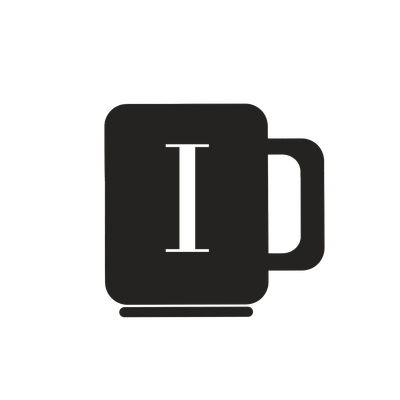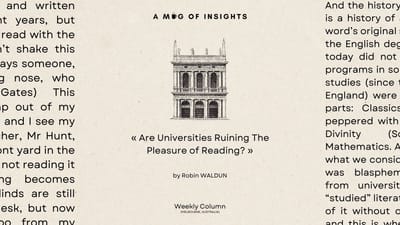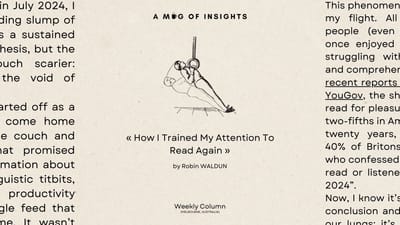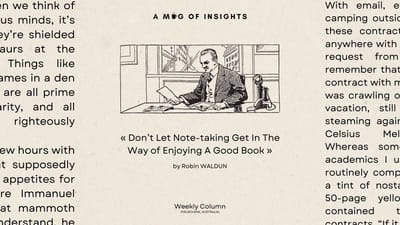The Question That Keeps Me Up At Night

Welcome to the weekly column from A Mug of Insights' new home! From now on, I'll dispatch these letters on Saturdays, and paid subscribers will receive their 1-2-Read letters on Mondays. If you like what you're reading, consider upgrading to the Grande tier for journal prompts and a practical exercise every week to strengthen your reading muscles! Thank you for reading, and I look forward to seeing you next week.
Why should we read books?
Sometimes this thought pops into my head when I’m busy teaching people how to get back to reading. Sure, I can jam my head in the sand and sing ‘reading is just good for you’ out of my ass all day long. But how is that better than Miss Thistlebottom guilting you into believing that you’ll end up a failure if you don't know how to read?
The internet is now full of knights leading a crusade against the declining literacy rates. It seems like people who struggle to read are now the scapegoats for everything that’s wrong with the world. So, to prosecute others while being in bed with the inquisitor, we’ve turned reading from a verb to the noun: reader, and this identity turned into an aspiration for some, and an aesthetic performance for others.
The problem, as I see it, is that these public outcries about literacy don’t propose specific solutions. They’re either vague second-order practices to get people to read more or recaps of depressing statistics for a soon-to-be post-literate society.
I’m aware of this bias in my work as well. On the one hand, second-order practices (read more in less time!) are much easier to discuss, and unfortunately, angry outcries about how no one reads anymore! attracts a lot more people than a sober, measured conversation around how to improve the situation.
This is why a question like What is reading for? keeps me up at night, because even as someone who has spent close to a decade defending reading, I still don’t have a clear answer. And if I don’t try to flesh it out, then I am no different from your stickler English teacher who guilted you into reading just because.
So, starting from this week, I’ll put my money where my mouth is and lean into this complex question: what is reading for? And for a start, let’s tune into how we see the world.
How we see the world: default position
Let’s start with something simple: your car throws a tantrum, and now it refuses to start. What’s your first reaction? Lift the hood? Get some cables? Call your insurance company?
Notice: whenever we encounter a problem the world throws at us, we’ll default to a set of responses. These are your default positions, and they came from your dad bullying you into getting your first car insurance plan, or from your uncle Bruce, who taught you how to down a beer while he started a car with cables.
Now, let’s say that none of the default responses work. The insurance company can’t send anyone out, and the spare battery + cables refuse to do their jobs. What then? This is when we step out of our default responses into consultation.
How we change the way we see the world: consultation
You race to your computer and type: Why can't I start my car? into Google, and the search engine spits out hundreds of solutions. You scroll through a few articles and nod: maybe it isn’t a battery problem but an engine problem.
Notice this subtle shift: before you consulted Google, anything outside of your default responses wasn’t an option because we don’t know what we don’t know. But even with just a few alternative solutions, you’re able to escape the definition of insanity: doing the same things over and over while expecting different results.
This is called consultation, and it is the basic unit of reading: escaping our default responses with information. This is when you realise that you haven’t checked your fuel gauge for weeks because gas is expensive. You head back to your car, turn the electricity on and see the arrow in the red zone: your car’s out of fuel. This is when you enter an experiment.
How we act on information about the world: experimentation
Luckily, you remember that you have an empty gas tank next to your lawnmower. You pull that sucker out, order a $5 Uber to a gas station and fill up the whole tank. But on your way home, you start to wonder if it really is a gas problem.
This is the experimentation phase, where we start to test information against reality. At this point, you’re still not sure if filling up your car will start the engine. So, you get home, dump all that gas into your tank and insert the car key while your palms sweat.
One tiny hum, then two, then three. Then the dashboard fires up, and the headlights ignite. Et voilà! The car’s ready to go.
You let out a sigh of relief, knowing that you don’t have to blow your monthly budget on a repair. And now, you’ll always remember to keep your tank full.
How we learn about the world: remembering
The learning process isn’t complete unless we remember and integrate the results of our experiment into our default response. Next time, you’ll remember to fill up your car because you’ve learned your lesson. In a sense, you’ve not only solved a problem, but you’ve also changed how you see the world. The learning loop is complete, and the same process goes on when we’re reading.
Back to the big question: what is the point of reading?
Let’s recap: a learning loop occurs when you start with how you see the world. When they fail, you consult other sources to get potential solutions. Then, you test those solutions against reality, and when one of them ends up working, you integrate that solution into your worldview.
The same thing happens with reading on a higher level. In life, having a car that refuses to start is the least of our worries. Sometimes we’ll meet an asshole at work who gives us hell. Sometimes we’ll struggle with our finances, and if we zoom all the way out, parts of life just don’t make any sense philosophically or spiritually.
So, when a problem inevitably pays a visit, the learning loop clicks into gear. We’ll test all our default responses: yelling back, starting day-trading or wallowing in existential dread. But here’s the thing: if our default responses are effective to begin with, then the problem won’t be a problem. We’re stuck because we refuse to move on to consultation.
This is where reading comes in. A good novel that taps into the core of human behaviour can give you a window into why that co-worker’s being an a$$. A credible book on personal finance will give you a window into a different way to think about cash flow, and a powerful philosophy book can clarify all the existential worries that keep you up past 3 am. In other words, reading is a window onto a different world; a world that is currently out of your grasp.
Without this view, we can’t move on to experimentation and integration. We don’t have enough tricks up our sleeves to test a solution, nor can we take away something to remember. This desperate state of not having enough knowledge, to borrow a term from cybernetics, shows a lack of requisite variety.
This fancy term, requisite variety, can be explained with knives. Imagine that sources of information are different models of Swiss pocket knives. A blog post is a basic model with a knife. A long journal article has a bottle opener and nail file built in. And a well-researched book is that crazy model with a pair of scissors, a can opener and a screwdriver alongside the blade.
See, as life throws you different situations, would you rather deal with them with a single blade, or have all the tools ready at hand? This is the power of building requisite variety with a good reading practice. As your knowledge base expands, you’ll have potential solutions for all the messy trials of life ready for experimentation.
This is why I advocate for people to read widely. Don’t just stop at literary theory, try a non-fiction book on linguistics. Don’t just stop at self-help; test your abilities with a philosophy book next. You never know when a theory will come in handy later down the road, and it’s always good to have a good assortment of tools under your belt.
Reversal: bookful blockheads
There’s a quote from Alexander Pope that’s been tattooed into my brain: bookful blockheads, ignorantly read. There’s a special kind of idiot who knows a whole lot of theory but never tests it in practice.
These are your closet academic, fact-hording types that gawk at a full-fledged Swiss pocketknife. “Just sharpen this damn thing over and over and you’ll be fine!” they say with their basic, single-blade model, until one day someone asks them to open up a bottle of wine, and they end up slitting their wrists with the curse of specialisation.
We’ll tackle this problem of overthinking and specialisation as we go deeper into this exploration of: why should we read? For now, leave me your thoughts below in the comments, and we’ll be right back.
Until next week
Robin
Subscribe to my newsletter to get the latest updates and news




Member discussion